Gardeners Limehouse: A Comprehensive Guide to Gardening in Limehouse
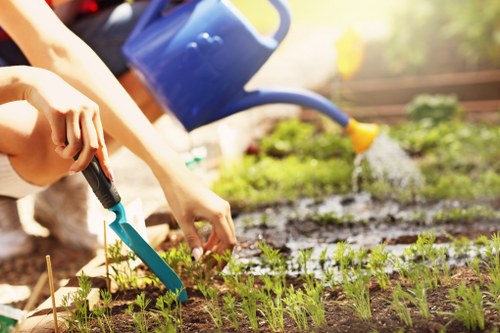
The Charm of Limehouse for Gardeners
Limehouse, located in the heart of London, is a vibrant area known for its rich history and picturesque landscapes. For gardeners in Limehouse, the area offers a unique blend of urban and green spaces, making it an ideal location for cultivating beautiful gardens.
Whether you're a seasoned gardener or just starting, Limehouse provides numerous opportunities to grow a variety of plants, flowers, and vegetables. The community here is supportive, with local gardens and green initiatives that encourage sustainable gardening practices.
With its close proximity to the River Thames, Limehouse benefits from a microclimate that is particularly favorable for certain types of plants. The area's blend of sunny spots and shaded areas allows gardeners to experiment with different gardening techniques and plant species.
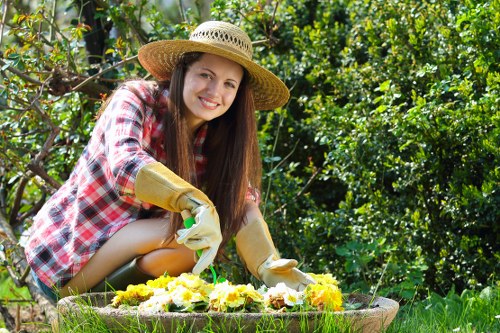
Essential Gardening Tips for Limehouse
Understanding Limehouse's Climate
The climate in Limehouse is classified as maritime, characterized by mild winters and cool summers. This climate is advantageous for gardeners as it reduces the risk of frost, allowing for a longer growing season.
Tip 1: Take advantage of the extended growing season by planting early in the spring and extending your harvest into the fall.
Tip 2: Utilize shade cloths in areas that receive intense sunlight to protect sensitive plants.
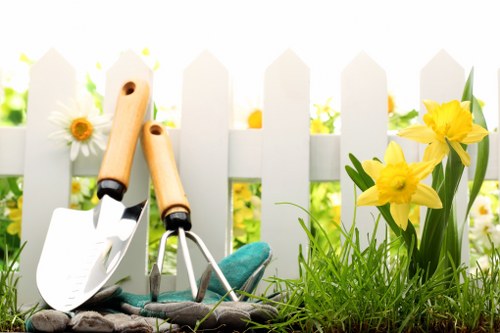
Soil Preparation and Maintenance
Healthy soil is the foundation of a thriving garden. In Limehouse, the soil can vary, so it's essential to test and amend it accordingly.
Step 1: Conduct a soil test to determine pH levels and nutrient content.
Step 2: Add organic matter such as compost to improve soil structure and fertility.
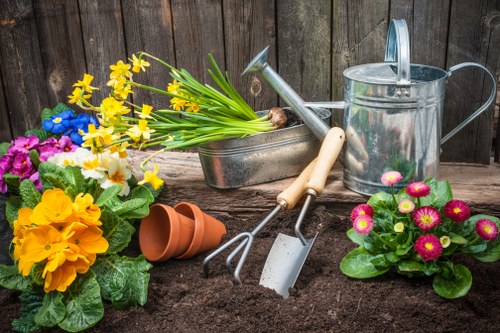
Choosing the Right Plants
Selecting plants that are well-suited to Limehouse's climate and soil conditions is crucial for success.
- Vegetables: Tomatoes, lettuce, and carrots thrive in this environment.
- Flowers: Marigolds, petunias, and roses are excellent choices.
- Herbs: Basil, rosemary, and mint grow well and add flavor to your meals.
Consider native plants as they are more resistant to local pests and diseases, reducing the need for chemical interventions.
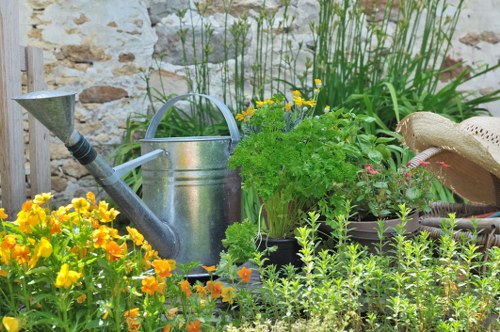
Local Resources for Gardeners in Limehouse
Community Gardens and Green Spaces
Limehouse boasts several community gardens where gardeners can collaborate, share tips, and cultivate plants together. These spaces provide access to shared tools and resources, fostering a sense of community among local gardeners.
Additionally, Limehouse Park and East India Dock Park offer ample green space for personal gardening projects and relaxation.
Local Nurseries and Suppliers
There are numerous nurseries in and around Limehouse that supply a wide variety of plants, seeds, and gardening tools. Shopping locally supports the community and ensures you get high-quality, fresh stock for your garden.
- Limehouse Plant Nursery: Specializes in native plants and organic gardening supplies.
- Thames Garden Centre: Offers a vast selection of flowers, vegetables, and gardening equipment.
- Urban Gardeners: Focuses on sustainable and urban gardening solutions.
Workshops and Gardening Classes
Continuing education is vital for improving gardening skills. Limehouse hosts various workshops and classes throughout the year, covering topics like organic gardening, pest management, and landscape design.
Participating in these educational opportunities can enhance your gardening techniques and keep you updated with the latest trends and best practices.
Seasonal Gardening in Limehouse
Spring: The Perfect Time to Start Planting
Spring in Limehouse is ideal for planting a wide range of vegetables, flowers, and herbs. The mild temperatures and increasing daylight hours promote healthy growth.
- Plant seeds indoors for seedlings that can be transplanted later.
- Prepare garden beds by removing weeds and adding compost.
- Start planting cool-season vegetables like peas and spinach.
Summer: Maintaining and Expanding Your Garden
During the summer months, gardeners in Limehouse can focus on maintaining their plants and expanding their gardens. Regular watering and mulching are essential to retain soil moisture.
Summer is also a great time to harvest fruits and vegetables, ensuring a continuous supply of fresh produce.
Autumn: Preparing Your Garden for Winter
Autumn is the time to prepare your garden for the colder months. This includes planting cover crops, pruning shrubs, and protecting tender plants from frost.
- Clear out fallen leaves to prevent pests and diseases.
- Plant bulbs for spring blooms.
- Store gardening tools and equipment properly.
Winter: Planning and Indoor Gardening
Winter in Limehouse calls for planning and indoor gardening activities. Use this time to design your garden layout for the coming year and start seeds indoors.
Indoor gardening, such as growing herbs on a windowsill, can keep your gardening spirit alive during the colder months.
Eco-Friendly Gardening Practices
Composting and Recycling
Composting is an essential eco-friendly practice that reduces waste and enriches your soil. Limehouse residents can create compost bins to recycle kitchen scraps and garden waste.
Recycling water through rain barrels is another sustainable practice that conserves water and provides your plants with natural irrigation.
Organic Gardening
Organic gardening avoids the use of synthetic pesticides and fertilizers, promoting a healthier environment. Use natural alternatives like neem oil and compost to manage pests and nourish your plants.
- Crop Rotation: Prevents soil depletion and reduces pest buildup.
- Natural Pest Control: Encourage beneficial insects like ladybugs and bees.
- Mulching: Conserves moisture and suppresses weeds.
Water Conservation
Efficient water use is crucial, especially in urban areas like Limehouse. Implementing drip irrigation systems and watering plants during the early morning or late evening can significantly reduce water waste.
Choosing drought-resistant plants can also help in maintaining a lush garden with minimal water usage.
Gardening Challenges in Limehouse
Limited Space
Urban gardening in Limehouse often means dealing with limited space. However, vertical gardening and container gardening are excellent solutions for maximizing your growing area.
- Vertical Gardens: Use trellises and wall-mounted planters to grow climbing plants.
- Containers: Utilize pots and raised beds to grow herbs, vegetables, and flowers.
Pollution and Air Quality
Urban areas like Limehouse can have higher levels of pollution, which can affect plant health. It's important to choose resilient plant species and ensure proper air circulation around your plants.
Regularly cleaning plant leaves can help remove pollutants and improve photosynthesis.
Pest Management
Pests can be a significant issue for gardeners in Limehouse. Implementing integrated pest management (IPM) strategies can help control pest populations without harming the environment.
- Biological Controls: Introduce natural predators like ladybugs.
- Physical Barriers: Use nets and garden fleece to protect plants.
- Natural Sprays: Apply neem oil or garlic sprays to deter pests.
Gardening Events and Festivals in Limehouse
Limehouse hosts various gardening events and festivals throughout the year, bringing together gardening enthusiasts to celebrate their passion.
Annual Garden Show
The Annual Garden Show in Limehouse showcases the best of local gardening talent. Visitors can explore garden displays, attend workshops, and participate in gardening competitions.
Community Planting Days
Community Planting Days encourage residents to come together and work on communal garden projects. These events foster a sense of community and promote sustainable gardening practices.
Workshops and Lectures
Regular workshops and lectures provide valuable knowledge on various gardening topics, from organic farming to landscape design. These educational events are perfect for both beginners and experienced gardeners.
10 Closest Areas to Limehouse for Gardeners
- Shadwell: Just north of Limehouse, Shadwell offers several community gardens and green spaces perfect for urban gardening.
- Stepney: Known for its diverse plant varieties, Stepney is ideal for gardeners looking to experiment with different species.
- Poplar: Home to various nurseries and garden centers, Poplar is a great place to source plants and gardening supplies.
- Canary Wharf: While primarily a business district, Canary Wharf has beautifully maintained gardens and green rooftops.
- Canning Town: Offers spacious parks and garden areas suitable for larger gardening projects.
- Elephant and Castle: Features several community gardens and eco-friendly gardening initiatives.
- Wapping: Known for its waterfront gardens and historical green spaces.
- Whitechapel: Provides access to urban farming projects and sustainable gardening programs.
- Isle of Dogs: Offers unique gardening opportunities with its waterfront location and community spaces.
- South Dock: Features green areas perfect for both beginner and experienced gardeners.
- Blackwall: Home to several private and public gardens that cater to diverse gardening interests.
- Millwall: Provides access to communal gardens and local gardening clubs.
Conclusion
Gardeners in Limehouse enjoy a unique blend of urban living and access to green spaces. With the right knowledge and resources, cultivating a beautiful and sustainable garden in Limehouse is entirely achievable.
By understanding the local climate, choosing appropriate plants, and utilizing available resources, gardeners can create thriving gardens that enhance both their living spaces and the community.
Embrace the gardening opportunities that Limehouse offers and contribute to the area's vibrant green landscape.

Frequently Asked Questions
1. What are the best plants to grow in Limehouse?
Some of the best plants for Limehouse include tomatoes, lettuce, marigolds, petunias, rosemary, and mint. These plants thrive in the mild maritime climate of the area.
2. How can I manage pests organically in my Limehouse garden?
Implement integrated pest management strategies such as introducing natural predators like ladybugs, using physical barriers like nets, and applying natural sprays like neem oil to control pests without harming the environment.
3. Are there community gardens available in Limehouse?
Yes, Limehouse has several community gardens where gardeners can collaborate, share resources, and work on collective gardening projects. These gardens foster a strong sense of community and support sustainable practices.
4. How can I conserve water in my Limehouse garden?
Conserve water by using drip irrigation systems, watering plants during early morning or late evening, using mulch to retain soil moisture, and selecting drought-resistant plant varieties.
5. Where can I find gardening workshops in Limehouse?
Limehouse hosts various workshops and classes throughout the year on topics like organic gardening, pest management, and landscape design. Check local community centers and garden centers for upcoming events.
Frequently Asked Questions
Get In Touch With Us.
Please fill out the form below to send us an email and we will get back to you as soon as possible.